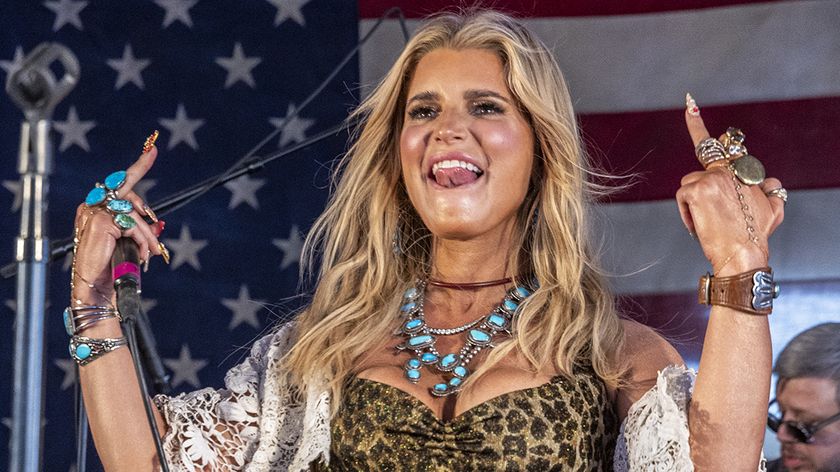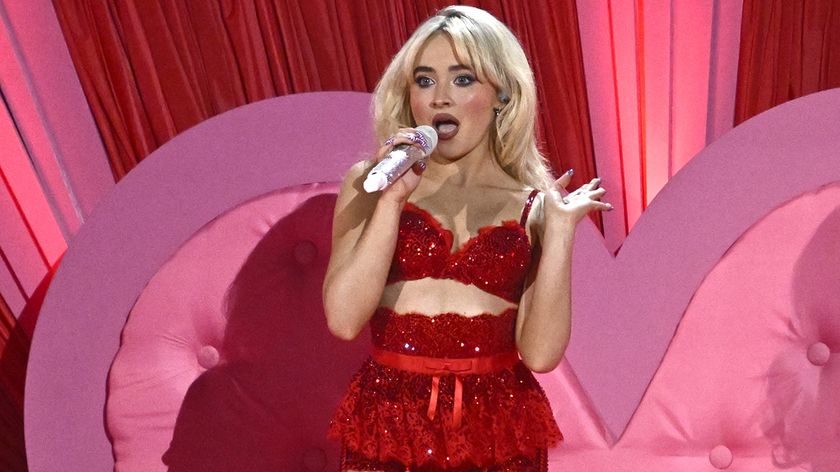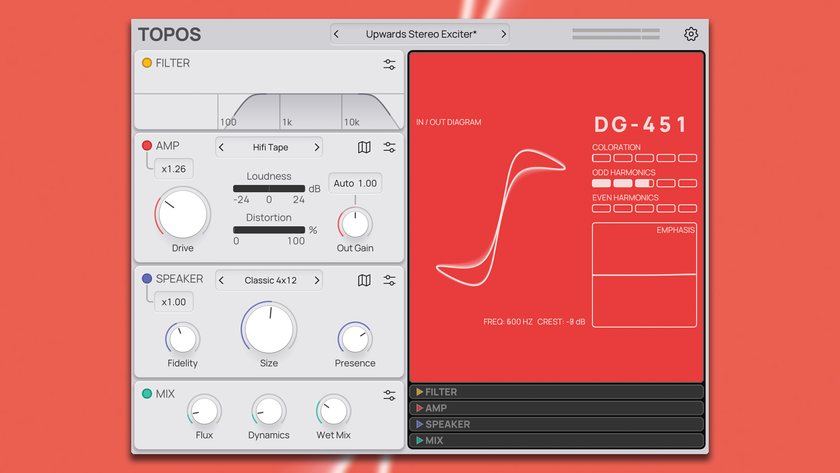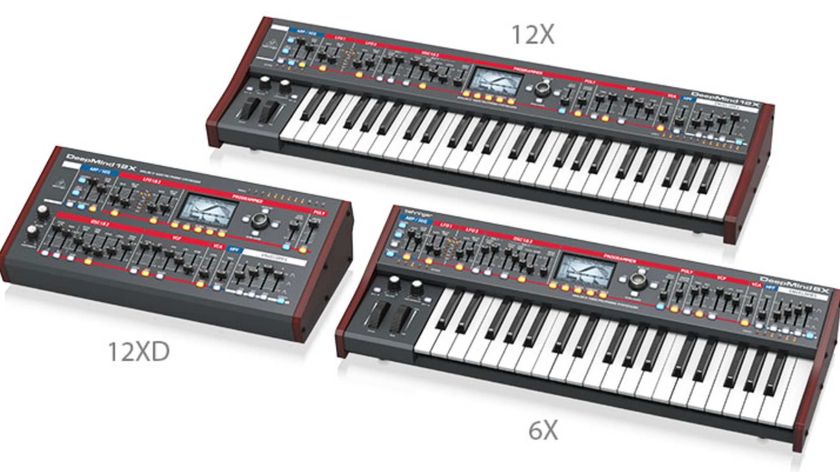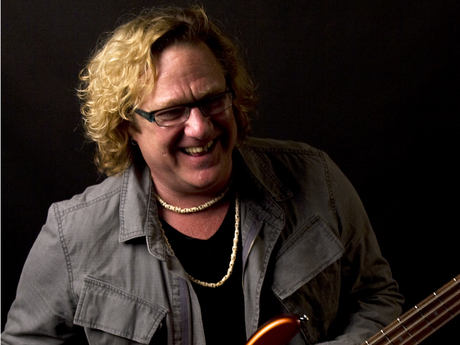
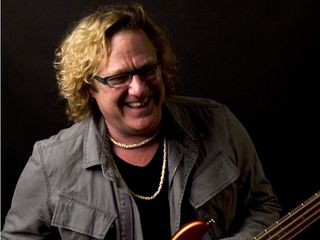
Stu Hamm is smiling because he just heard a playback of his brilliant new album, Just Outside Of Normal. © Chris Walker
To bass fans across the globe, Stu Hamm needs little or no introduction. Over a career that now spans over three decades, he's appeared on albums and tours with the likes of Steve Vai, Joe Satriani, Eric Johnson, Frank Gambale, Michael Schenker and Yngwie Malmsteen, just to name a new.
In addition, Hamm's inventive and virtuosic bass stylings have been front and center on his own solo recordings, such as Radio Free Albemuth, Kings Of Sleep and The Urge. Live, Hamm has awarded the bass top billing on 2006's Bx3 tour (a sort of spin-off of the Satch-Vai G3 guitar extravaganza), which saw him go toe-to-toe-to-toe with fellow four-string legends Billy Sheehan and Jeff Berlin.
Last December, Hamm issued his first solo CD in 10 years, Just Outside Of Normal. Over the course of nine engrossing cuts, he tackles rock, classical, swing, polka (yes, you read correctly - polka!), and he even puts a surprisingly fresh spin on the Led Zeppelin gem Going To California. Notable guest stars turn up here and there (Joe Satriani, Robert Fripp, Frank Gambale), but make no mistake, Stu's the star here on what might be his finest hour - or 50 minutes, if you want to get technical.
Last week at NAMM, MusicRadar caught up with Hamm to talk about his new Washburn bass called, appropriately enough, The Hammer. But we also found a good chunk of time to discuss the recording of Just Outside Of Normal.
What is the process for writing a decidedly bass-centric album? Do you record riffs and sections, much as a guitarist would?
"I do have a lot of riffs and sections of songs, yes, but for me, a song doesn't really become real until I have a title. I need to call a piece of music something and connect with it. To me, songs are like stories. So once I start relating to them on a personal level, they become something more than, you know, exercises in G minor. [laughs]
Get the MusicRadar Newsletter
Want all the hottest music and gear news, reviews, deals, features and more, direct to your inbox? Sign up here.
"I've played a lot of high-octane guitar music during my career, which I certainly enjoy. But as you can imagine, on a lot of that stuff, the role of the bass is pounding out the eighth notes. So when I do sit down and write my own music or record a solo album, I try to feature other instrumentation. Making a record like this is tricky: you want the bass to play a melodic role, but it's still gotta hold down the bottom or everything falls apart."
What kind of gear do you demo on?
"At home in my SkyBluesSciFiStuStuStudios, I use a Korg D1600, and it's great. It keeps me from using Logic or Pro Tools and staring at a computer screen, which I don't enjoy when I'm trying to make music. It's terrific for getting ideas down, but I actually recorded some of the tracks that made it to the album.
"When I do my remote recording, I have the website, Tracks by Stu.com, where people send me their songs and demos. When I play on those things, I'll use the Korg for them, too. It's great for punching things in and looping and everything. If I feel that I really need to concentrate on something or if I need some room miking, then I go to this place in Berkeley, Artspoke Studios, and my engineer and co-producer, James Boblak, will get involved."
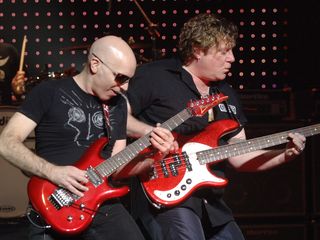
On stage with Joe Satriani in 2008. © Tim Mosenfelder/Corbis
How long did it take to write the songs? Also, did you have them all fleshed out before you worked with the other players?
"It's hard to say how long everything took to write. But I do like to compose with certain players in mind, and I try to leave room for them to do their thing. I have the basic framework of the songs - the main melodies, the verses, choruses - and then I'll kind of see if they can take what I have and make it better. Most of the time, they do. I'm just lucky enough to know people like Joe Satriani and Frank Gambale and Mark McGee and all these amazing people who can take a track from point A to point Z."
Having been a sideman on many other people's projects, what kind of boss is Stu Hamm in the studio? Are you a good guy? A taskmaster? A little of both?
"I'm definitely harder on myself than I am on anybody else. I'm working on that, though, and hopefully I'll keep learning and growing as a musician and a person. But one important thing I've discovered over the years is that a good record doesn't mean it's free of mistakes. A good record should sound like it's the first time the people have played the music. So if there's a little bit of a goof here or there, chances are I'm the only person who's going to hear it. The spark of the overall song is what counts. If you don't have that, you're toast.
"Overall, I'm pretty easygoing in the studio; I try to make sure everybody gets to contribute and have fun. Like I said, though, I can beat myself up pretty good, especially if I'm working on my own or with James Boblak. I can very easily get into that can't-see-the-forest-for-the-trees zone, and that's when I need James to reign me in and say, 'It's great, Stu. It was great an hour ago. Move on to something else.'"
When making a solo album, is your aim to appeal primarily to bassists and musicians, or is your ultimate goal to hopefully reach the casual listener?
"I think this album is certainly for the general listener, but I think I can still please my core fans and all the bassists and musicians out there, sure. It's probably pretty easy to have preconceptions about what I do, but with Just Outside Of Normal, I tried to create a 50-minute journey for everybody. That's why there's a wide variety of music, both stylistically and sonically.
"I'm all for hearing great musicians playing at the top of their game, but everything in its time and place. Hey, even I get bored listening to, say, certain bebop records where it's the same instrumentation, the same tones, the same tempos - you know what I mean? If you're just making a record to show how fast and complicated and cerebral your music can be, you're not going to win over a lot of people."
What's it like working with Joe Satriani when you're the one calling the shots? Most of the time, we associate you with backing him up. When he plays on your songs, does the dynamic between the two of you change?
"I was really lucky to have him play on this record, particularly since it came at a time when he was finishing his new album. I know what Joe can do, and I certainly wrote The Obligatory Boogie for him. It can be a fine line, though: I sent him the tracks and said, 'Have your way with them.' Obviously, he nailed the boogie. I'm pretty picky as to how I like my melodies played, so when it came time to do Windsor Mews, we sent them back and forth a bit and I would say, 'I'd like it a little more like this.' That's just for melodies. When it comes to solos, I want Joe and any of the other guitarists on the record to play what they feel."

Earlier this month, playing his new Washburn 'The Hammer' bass in Rome. © Francesco Desmaele
"I can't push Joe the same way I might other people musicians, but that's OK. I want Joe to be Joe. What he brings to the music is always so different and unique that I find myself constantly amazed. He comes up with things I never could have imagined, so I'm pleased as punch." [laughs]
You and Joe have quite a long history together. Describe your relationship.
"It's one of mutual respect. It's not like we're best pals or buddies or anything. We've certainly spent a lot of time on the road together and have played places all over the world. But we don't go to the movies or go jogging together. Our relationship is very professional, and my admiration for the guy is immense. In terms of my career, I certainly owe him a lot - him and Steve Vai."
Another guitar giant appears on the album - Robert Fripp. How did his involvement come about?
"I was on tour with Joe, and we were playing the Shepherd's Bush Empire in London. We found out that Mr Fripp, who was going to be on the next G3 tour, was coming to the show and was planning on dropping by to say hi. We were all like, 'What do you say to Robert Fripp?' And I said, 'I know! Let's all call him 'Bobby' when he comes in. I'll bet nobody calls him Bobby.' Either he would love it or he'd think we were a bunch of American idiots.
"As it turned out, he thought it was funny, and we had a great time talking. We hit it off and formed a nice friendship. He's fantastic. Over the years, we would talk on the phone quite a bit. He'd even call me up just to tell me jokes and stuff. You don't expect Robert Fripp to do that, but he's a very normal, friendly guy. I ended up playing with him a few times, which was incredibly cool. At one point, I asked him if he wanted to collaborate on something, and he sent me this soundscape he had been working on. I loved it, but it took me a while to figure out how to use it.
"Then I heard this amazing singer, Malika Alaoui, who was performing with Cirque du Soleil in Chili, and man, she blew me away. I had been working on the song Lucidity for some time, and when I heard her I knew she was perfect - and I realized that the Robert Fripp track would work on it, as well. Everything came together. I had the lyrics, sent them to Malika along with the track, and she sent me a couple of versions back, one of which was spot-on.
"The song is about being in control of our dreams - it's pretty heady - and Robert's track couldn't have been more perfect for it. Funny how stuff like that happens. Obviously, I'm honored to have the name Robert Fripp on an album of mine. He's one of my all-time heroes."
You used a few different drummers - Stanton Moore, Alan Hertz, John Mader. Why not use just one drummer? Did you want different feels and approaches to different songs?
"Absolutely. This is definitely a studio album, so I wanted the songs and the styles to go different places. I didn't want one feel throughout. All the drummers were a pleasure to work with. Plus, different drummers bring out different things in me. So it's not always about the sound of the drums; sometimes it's about changing the way I play."
I have to comment on The Clarinet Polka. You always have a way of showing your sense of humor, but is that song meant ironically?
"Sort of, but not really. In no way do I want it to come off as though I'm making fun of polka music, because a lot of it is amazing. I did my homework, too, and downloaded a bunch of different versions of this song. I had a blast playing on it, and yeah, it's supposed to be fun. Let's face it: polka music is all about good times."
I'm curious as to your choice of Going To California. Of all the songs in the Zep catalogue, what made you go with that one?
"When I was growing up, I really didn't listen to a lot of Led Zeppelin. My family was more interested in classical music. The heaviest music I was exposed to was The Beatles, and then later I got into bands like Yes and ELP and Pink Floyd and stuff like that. I discovered Zeppelin later in life.
"A while back, I did a benefit with Jude Gold for Muscular Dystrophy, and Going To California was one of the songs we played. It really stuck with me, and I loved the groove of the song. I started doing this arpeggio thing with it, and playing kind of a drone on it and harmonics, and I thought, Wow, this works really well. I can do something with this.
"Over the years, I've continued to play it live, but on the record I played it at a much faster tempo. I did all the basses first, and then I had Alan come in and do the drums. All the things that sound like guitars are basses except for the slide solo, which is played by Mark McGee, who did a phenomenal job. He really killed it. I'm really happy with it; it's so spiritual sounding. Everybody equates Zeppelin with heavy stuff, but they did a wide range of music and much of it was quite beautiful."
Joe is a freelance journalist who has, over the past few decades, interviewed hundreds of guitarists for Guitar World, Guitar Player, MusicRadar and Classic Rock. He is also a former editor of Guitar World, contributing writer for Guitar Aficionado and VP of A&R for Island Records. He’s an enthusiastic guitarist, but he’s nowhere near the likes of the people he interviews. Surprisingly, his skills are more suited to the drums. If you need a drummer for your Beatles tribute band, look him up.

"Reggae is more freeform than the blues. But more important, reggae is for everyone": Bob Marley and the Wailers' Catch a Fire, track-by-track

“Part of a beautiful American tradition”: A music theory expert explains the country roots of Beyoncé’s Texas Hold ‘Em, and why it also owes a debt to the blues


